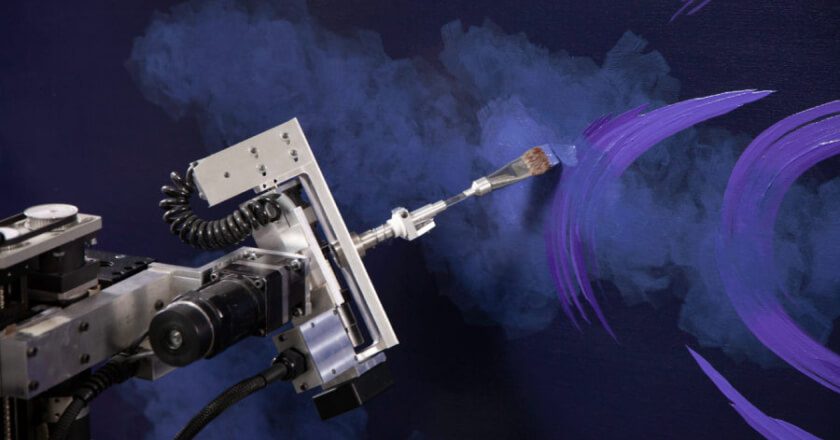Get Inspired
Build the life you love. Learn more about fusioneering:

Posted on October 19, 2022 in AI Technology
Ancient peoples told tales of artificial beings built to serve them. Charles Babbage and Ada Lovelace questioned what a machine built on math could be capable of. Alan Turing questioned if a computer could “think.”
Now, in the 21st Century, these fantastical ideas of the old world have become the real fabric upon which modern society is built. Artificial intelligence (AI) and machine learning are everywhere. As technological progress surges forward, we ask lofty and difficult questions of computer-based intelligence – are they good or bad, can they truly think, can they develop self-awareness, can they make art – but the truth is that AI in the present is already a marvel to behold.
Here are five ways AI and machine learning are already present in your life and changing the ways you interact with the world.
Read More: A Brief History of AI
A short time ago, access to information meant reading through texts in a library or finding an expert to talk with. The internet, and later smartphones, vastly increased the ease of access to knowledge. Now? All you have to do is ask. With digital assistants like Alexa, Siri, Google, and Cortana, endless information is just a question away – and difficult tasks are made simple with a personal helper that fits in a pocket or the palm of a hand. These digital personal assistants not only use complex algorithms and machine learning to detect and understand vocal commands, but also to scan through thousands of lines of data per second in order to return accurate and individualized answers to queries.
Social media and online marketing know what you like and what you don’t, and they cater to you based on machine learning algorithms designed to figure out your interests. Programs and platforms track your activity, searches, and responses to various pieces of content, and use the generated data profile to serve you posts, advertisements, and friend recommendations curated to resonate with your individual personality. As you continue to engage, the algorithms continue to refine their idea of “you.”
Just as social media and marketing are trying to understand you to better serve you, so too are streaming services such as Netflix, Spotify, and Twitch. To recommend new media to users, streaming services use machine learning and AI to sift through user data on past streaming history and preferences. The services consider the genre of the content, the time period it was made, the crew involved, how long you engaged with it, and even what time of day you engaged with it in order to build a user preference profile. Netflix even goes so far as to change content thumbnails based on what they think will be more visually appealing to a given user.
Additionally, streaming services use AI to ensure smooth, high quality, uninterrupted streams. Server and bandwidth allocation is handled by automated systems in order to achieve the best experience for customers.
AI is heavily involved in modern banking to help prevent and detect fraud. Have you ever gotten a suspicious activity alert on a credit card or checking account? That assessment came from a computer. Machine learning algorithms sort through vast amounts of financial data and analyze hundreds of thousands of transactions in a single second. These systems build a personal profile for every banking account with parameters for what defines a “normal” or “suspicious” transaction for a given profile. Through machine learning, these profiles improve and become more accurate over time. For every purchase, the systems take into account the type of transaction, the time and duration of the transaction, the location of the transaction, the likelihood of a specific account making the transaction, and more. With this data, a fraud score is assigned to every account action and is used to immediately determine if a transaction should be approved, rejected, or flagged for review.
In the current century, the search engine is the gateway to the internet. These search tools, like Google, may seem somewhat straightforward given their extensive role in our daily lives – however, they’re actually constructed from a vast density of incredibly complex algorithms and AI programs. Search engines not only use machine learning and AI to build a profile of your likes and dislikes (as with the above examples), but also to understand the human queries they’re asked, to identify low-quality or spammy web pages, to rank websites based on content quality and relevance, and to ensure a streamlined user experience.
Google’s complex web of AI programs is a constantly changing and closely guarded secret that the company only ever gives a glimpse into. It’s easy for individuals and corporate entities to obsess over how these algorithms work, since they essentially determine everything about how information and sites are accessed by the public.
See for yourself Paul Kirby and Dulcinea’s journey to create emergent art. Follow the Kirby Foundation on Instagram and Facebook, for more insights into the worlds of art and science, and join the mailing list to ensure you never miss an update!
Are you interested in hearing the complete story of Paul and Dulcinea? Watch the video (nominated for Best Short Film at the 2021 Vail and Portland Film Festivals) for more info.
Want to be the first to know about every exciting new project at the Kirby Foundation?
Join Our Mailing ListBuild the life you love. Learn more about fusioneering:
Why pick which passion you should follow? Fusioneering allows you to cultivate many interests into something innovative and revolutionary.

Meet Paul and explore how blending your interests can empower you to follow your enthusiasm and bring your passions to life.